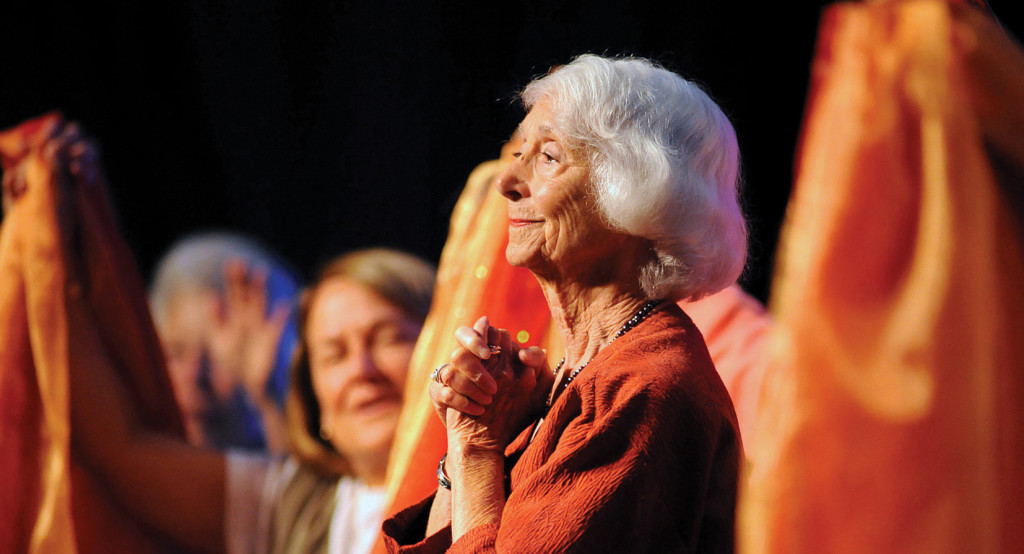
Right, keynote speaker Barbara Marx Hubbard smiles on August 8, 2012 as she is greeted by delegates at the annual assembly of the Leadership Conference of Women Religious in St. Louis. She spoke on “The Transformation of Consciousness and Religious Life Leadership” (CNS photo).
Using what he acknowledged was unusually “blunt” language, the head of the Vatican’s doctrinal office in late April rebuked officers of the Leadership Conference of Women Religious for honoring a Catholic theologian whose work was judged “seriously inadequate” and for promoting futuristic ideas he described as “opposed to Christian revelation.”
Cardinal Gerhard Mueller, prefect of the Congregation for the Doctrine of the Faith, made the remarks April 30 in an address to the presidency of the LCWR, a Maryland-based umbrella group that claims about 1,500 leaders of US women’s communities as members, representing about 80 percent of the country’s 57,000 women religious. The group is currently undergoing a major reform ordered by the Vatican in 2012.
The text of Cardinal Mueller’s remarks was posted on the congregation’s website.
At the April 30 meeting with LCWR officials, Cardinal Mueller voiced “increasing concern” about the LCWR’s promotion of the “concept of conscious evolution” in various publications and in the “directional statements” of some member congregations.
Conscious evolution is a set of ideas developed in the writings of Barbara Marx Hubbard, who addressed the LCWR annual assembly in 2012. Hubbard’s website describes the concept as “part of the trajectory of human evolution, the canvas of choice before us now as we recognize that we have come to possess the powers that we used to attribute to the gods.”
According to the cardinal, the “fundamental theses of conscious evolution are opposed to Christian revelation and, when taken unreflectively, lead almost necessarily to fundamental errors regarding the omnipotence of God, the incarnation of Christ, the reality of original sin, the necessity of salvation and the definitive nature of the salvific action of Christ in the paschal mystery.”
“Conscious evolution does not offer anything which will nourish religious life as a privileged and prophetic witness rooted in Christ revealing divine love to a wounded world,” he said. “The Gospel does! Selfless service to the poor and marginalized in the name of Jesus Christ does!”
Cardinal Mueller also said he was saddened by plans to give a major award at the group’s annual assembly in August to St. Joseph Sister Elizabeth A. Johnson. In 2011, the US bishops’ Committee on Doctrine criticized one of Sister Johnson’s books as containing “misrepresentations, ambiguities and errors” related to the Catholic faith.
The LCWR’s award to the theologian “will be seen as a rather open provocation against the Holy See and the doctrinal assessment,” the cardinal said. “Not only that, but it further alienates the LCWR from the bishops as well.” The prefect said he would not prevent Sister Johnson from receiving the award, but that the Vatican expected LCWR officials henceforth to seek advance approval from Archbishop J. Peter Sartain of Seattle for “invited speakers and honorees” at major events.
“In the end, the point is this: The Holy See believes that the charismatic vitality of religious life can only flourish within the ecclesial life of the Church,” the cardinal said. “The LCWR, as a canonical entity dependent on the Holy See, has a profound obligation to the promotion of that faith as the essential foundation of religious life.”
In 2012, the Vatican announced a major reform of the LCWR to ensure its fidelity to Catholic teaching in areas including abortion, euthanasia, women’s ordination and homosexuality. The Vatican appointed Archbishop Sartain to implement the congregation’s “doctrinal assessment,” by providing “review, guidance and approval, where necessary, of the work” of the LCWR.
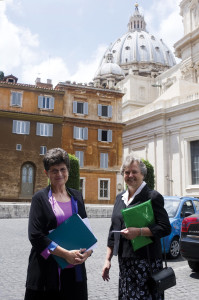
Here, Franciscan Sister Pat Farrell, left, president of the Leadership Conference of Women Religious, and St. Joseph Sister Janet Mock, right, the organization’s executive director, are pictured outside the Congregation for the Doctrine of the Faith following their meeting with US Cardinal William J. Levada and US Archbishop J. Peter Sartain at the Vatican on June 12, 2012.
LCWR officials have characterized the assessment as a “flawed process that lacked transparency,” and the disciplinary measures imposed by the Vatican as “disproportionate,” saying they compromised the organization’s ability to fulfill its mission.
In a written statement responding to a reporter’s inquiry, LCWR officials said the prefect’s “remarks were meant to set a context for the discussion that followed. The actual interaction with Cardinal Mueller and his staff was an experience of dialogue that was respectful and engaging.”
LCWR officials later sent a message to their members and included the full text of Cardinal Mueller’s introductory remarks. They said that “in the honest, respectful and engaging discussion that followed Cardinal Mueller’s opening remarks, we were able to offer responses that illuminated some of the perceptions about LCWR held by the Congregation for the Doctrine of the Faith.”
For instance, they said, “in our discussion about the 2014 LCWR Outstanding Leadership Award, we noted that Elizabeth Johnson, CSJ, served the universal Church on a pontifical commission and was a consultant to the USCCB in the areas of ecology, science and faith.”
“We further shared how distressing it is to realize that one aspect, in one book, of a distinguished theologian’s body of work seems to cast the entire body of respected and credible work in its shadow.”
Without using the term “conscious evolution,” the officials said that “when LCWR continues to read the signs of the times, within the context of our Catholic beliefs and tradition, it is an effort to attend to emerging insights and learnings. We are exploring these areas of contemporary culture, we are not proposing them. Nor are we using them to replace our firm commitment to the Christological foundation of consecrated life.”
Cardinal Mueller’s Address to Presidency of the Leadership Conference of Women Religious (Excerpts)
April 30, 2014
I am happy to welcome once again the Presidency of the LCWR to Rome and to the Congregation. It is a happy occasion that your visit coincides with the Canonization of Pope John Paul II and Pope John XXIII, two great figures important for the Church in our times. I am grateful as well for the presence and participation of the Delegate for the implementation of the LCWR Doctrinal Assessment, Archbishop Peter Sartain…
First, I would like to acknowledge with gratitude the progress that has been made in the implementation of the Doctrinal Assessment…
It saddens me to learn that you have decided to give the Outstanding Leadership Award during this year’s Assembly to a theologian criticized by the Bishops of the United States because of the gravity of the doctrinal errors in that theologian’s writings. This is a decision that will be seen as a rather open provocation against the Holy See and the Doctrinal Assessment. Not only that, but it further alienates the LCWR from the Bishops as well. I realize I am speaking rather bluntly about this, but I do so out of an awareness that there is no other interpretive lens, within and outside the Church, through which the decision to confer this honor will be viewed.
It is my understanding that Archbishop Sartain was informed of the selection of the honoree only after the decision had been made. Had he been involved in the conversation as the Mandate envisions, I am confident that he would have added an important element to the discernment which then may have gone in a different direction…
Let me address a second objection, namely that the findings of the Doctrinal Assessment are unsubstantiated. The phrase in the Doctrinal Assessment most often cited as overreaching or unsubstantiated is when it talks about religious moving beyond the Church or even beyond Jesus. Yes, this is hard language and I can imagine it sounded harsh in the ears of thousands of faithful religious. I regret that, because the last thing in the world the Congregation would want to do is call into question the eloquent, even prophetic witness of so many faithful religious women. And yet, the issues raised in the Assessment are so central and so foundational, there is no other way of discussing them except as constituting a movement away from the ecclesial center of faith in Christ Jesus the Lord.
For the last several years, the Congregation has been following with increasing concern a focusing of attention within the LCWR around the concept of Conscious Evolution. Since Barbara Marx Hubbard addressed the Assembly on this topic two years ago, every issue of your newsletter has discussed Conscious Evolution in some way. Issues of Occasional Papers have been devoted to it. We have even seen some religious Institutes modify their directional statements to incorporate concepts and undeveloped terms from Conscious Evolution.
Again, I apologize if this seems blunt, but what I must say is too important to dress up in flowery language. The fundamental theses of Conscious Evolution are opposed to Christian Revelation and, when taken unreflectively, lead almost necessarily to fundamental errors regarding the omnipotence of God, the Incarnation of Christ, the reality of Original Sin, the necessity of salvation and the definitive nature of the salvific action of Christ in the Paschal Mystery…
I do not think I overstate the point when I say that the futuristic ideas advanced by the proponents of Conscious Evolution are not actually new. The Gnostic tradition is filled with similar affirmations and we have seen again and again in the history of the Church the tragic results of partaking of this bitter fruit. Conscious Evolution does not offer anything which will nourish religious life as a privileged and prophetic witness rooted in Christ revealing divine love to a wounded world. It does not present the treasure beyond price for which new generations of young women will leave all to follow Christ. The Gospel does! Selfless service to the poor and marginalized in the name of Jesus Christ does!…
I have raised several points in these remarks, so I will stop here. I owe an incalculable debt to the women religious who have long been a part of my life. They were the ones who instilled in me a love for the Lord and for the Church and encouraged me to follow the vocation to which the Lord was calling me. The things I have said today are therefore born of great love…
Contributing to this story was Cindy Wooden at the Vatican.

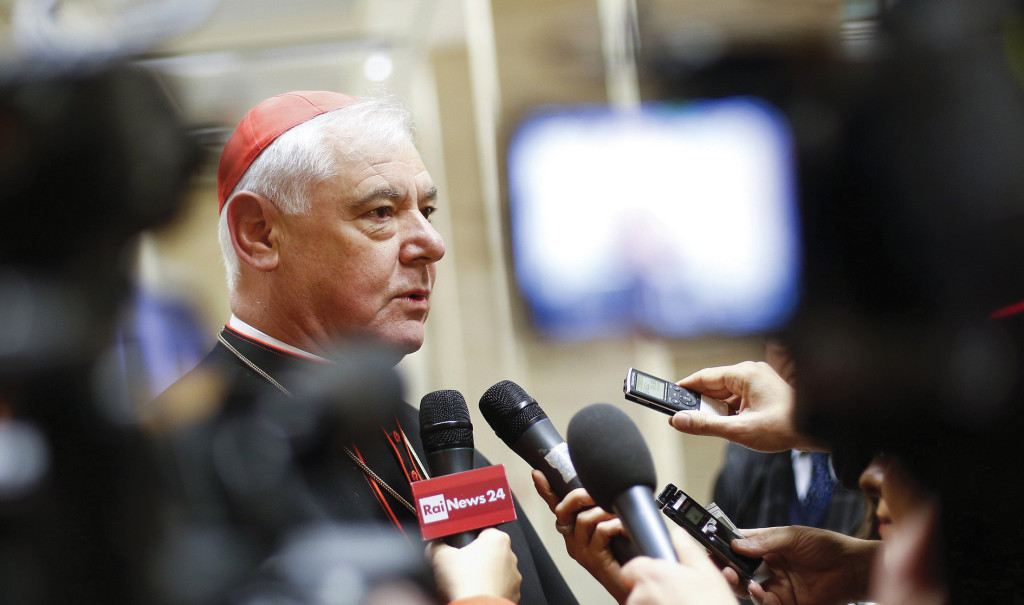


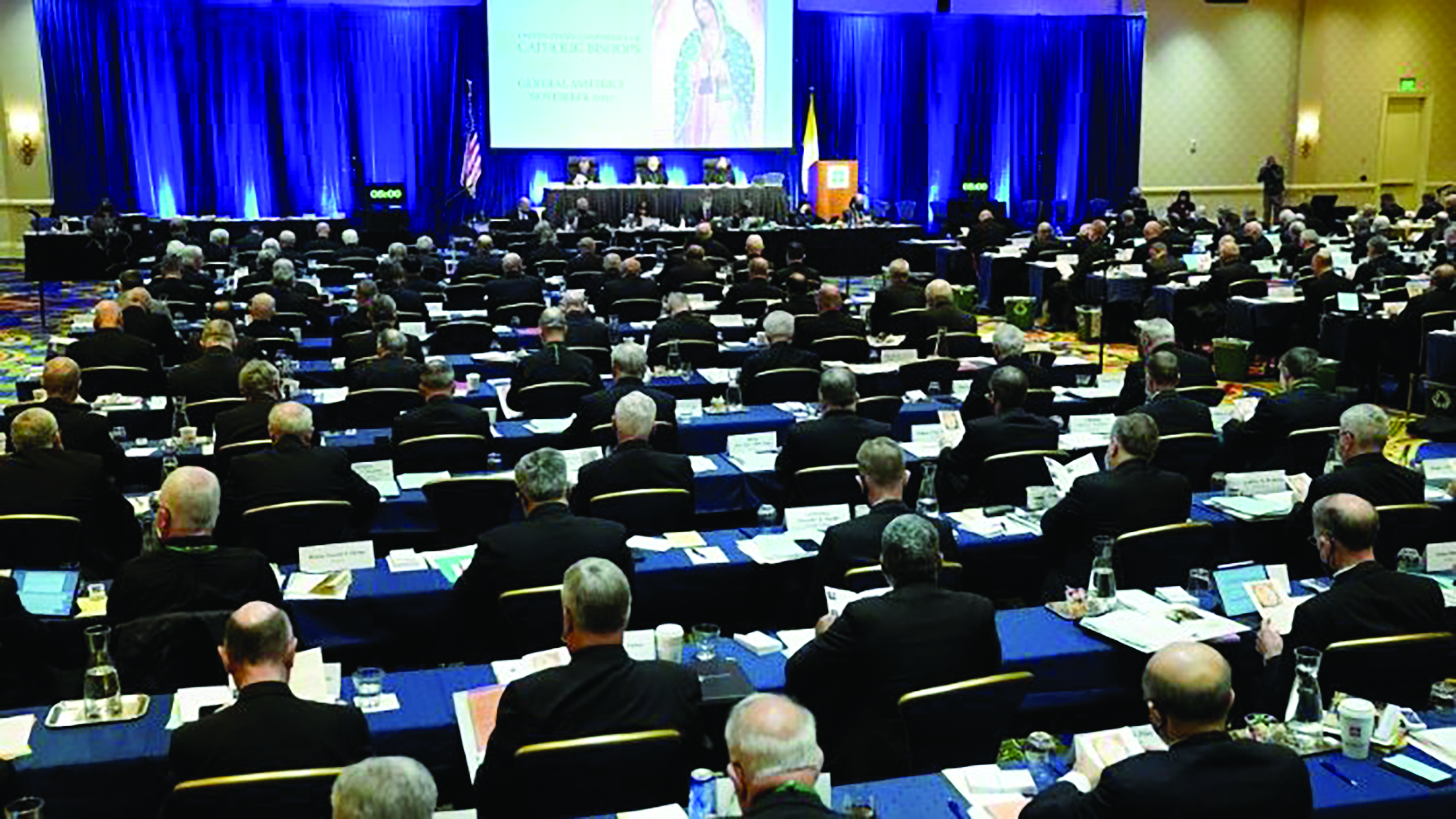
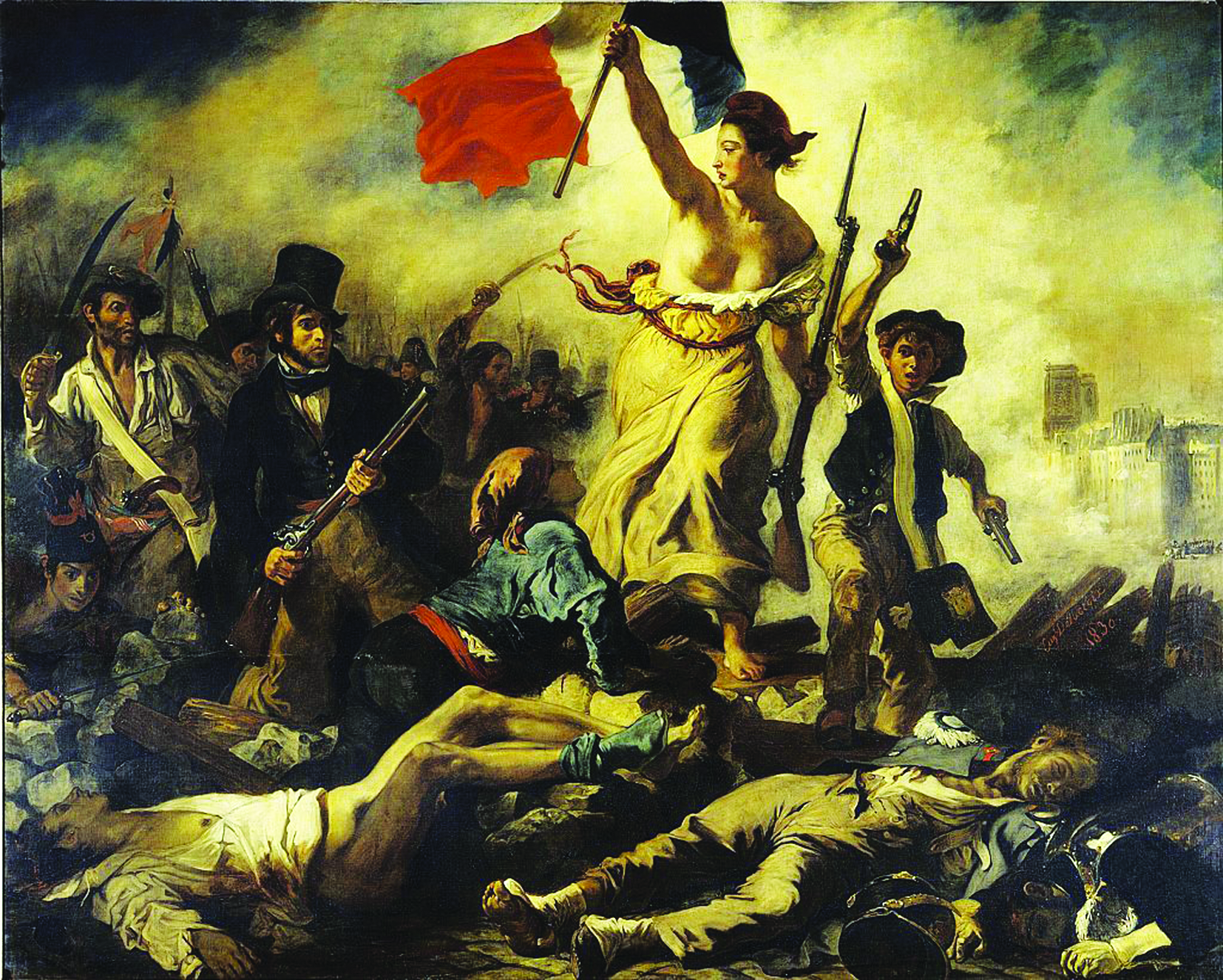

Facebook Comments